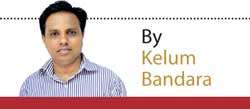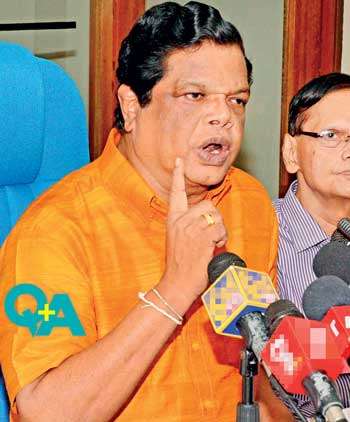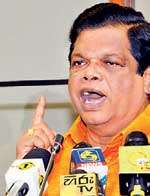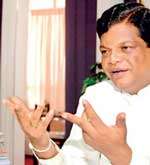31 Jul 2018 - {{hitsCtrl.values.hits}}
 Joint Opposition MP Bandula Gunawardane, in an interview with the Daily mirror , speaks on the economic situation of the country and the impact of recent tax reforms.
Joint Opposition MP Bandula Gunawardane, in an interview with the Daily mirror , speaks on the economic situation of the country and the impact of recent tax reforms.
Excerpts:
QThe Government has introduced a new tax policy. It is to increase the percentage of direct tax revenue for the State coffers. How do you view it?
It is an unfair strategy to raise revenue. According to my knowledge, Finance Minister Mangala Samaraweera lacks theoretical knowledge on direct and indirect taxation. In the countries such as those in the SAARC region, it is economically unrealistic to maintain direct taxation at 40 per cent and indirect taxation at 60 per cent.
 QWhy do you say so?
QWhy do you say so?
There is a tax base. Direct taxation is done proportionate to people’s income and profit levels, and their properties. We do not have a large social segment here in Sri Lanka with a firm economic footing to pay direct taxes as a large percentage. Sri Lanka made an economic leap after the end of the war in 2009 under the Mahinda Rajapaksa rule and became a lower middle-income country. Until such time, our annual Gross Domestic Production (GDP) remained at less than the US $ 25 billion, be it under a closed economic system or an open economic system. In the post-war era, the GDP rose to US $ 82 billion by 2014 when the Rajapaksa era ended. Only in a higher middle-income country or a developed country, can 40 per cent ratio direct taxation be expected. It is realistically possible in countries such as the United States, the United Kingdom, Malaysia and Switzerland. These countries have their tax bases which are economically well-off. Our tax base is small. If we increase direct taxation, our industrialists and landed proprietors will be liable for taxes more and more. If the Government heaps them with a tax upon taxes, they will get a severe beating in the economic sense.
The private sector is the engine of growth in the economy. When we mention the private sector, a petty-minded JVP member would think of company giants. The private sector even covers farmers, small and medium entrepreneurs, retailers, wholesale traders, importers...
QIn contrast, the increase of indirect taxation will result in the price hike of food commodities and all. Isn’t it an advantage to have a higher ratio direct taxation?
If we levy Rs. 25 on a kilogramme of sugar, it will be a huge tax burden for someone earning Rs.1,000 per day, for example. Yet, for someone with a daily income of Rs.100, 000, it is not a burden. That is the end result of indirect taxation. There is a heavy tax burden on the lower-income groups and less burden on the high-income groups. If we exempt essential items from taxation altogether, we can avoid such impact. Another measure to mitigate the impact is high taxation on luxury items. Or else, subsidies should be given to low-income groups. In the developing countries, the increase of direct taxation is not economically advisable in the long run.
The private sector is the engine of growth in the economy. When we mention the private sector, a petty-minded JVP member would think of company giants. The private sector even covers farmers, small and medium entrepreneurs, retailers, wholesale traders, importers, exporters and service suppliers.
If you burden the private sector with large taxation, investment will be discouraged. It will reduce employment opportunities eventually. We have to implement the tax policy in a manner that will not discourage investments.
The United National Party (UNP), in a clear departure from their past attitude, launched a scathing attack on the private sector after assuming office in 2015.
The entire country was bustling with economic activities before 2015. Those, engaged in such private sector economic activities, were dubbed fraudsters by then Minister Ravi Karunanayake.
They were accused of having ill-gotten wealth. He imposed the Super Gain Tax with retrospective effect. Investment dropped by Rs. 50 billion as a result during that year. There were a few other similar taxes such as Mansion Tax imposed totally out of venom, targeting the private sector.
The directors of leading companies were hauled before the Financial Crimes Investigation Division (FCID).
The Government implemented the 100-Day-Programme. It is a programme worked out by JVP leader Anura Kumara Dissanayake, former President Chandrika Bandaranaike Kumaratunga, the NGO representatives and the UNP. They all had a bitter attitude towards the private sector. They vented their anger against the private sector in that manner.
QTaxation is needed to raise revenue for the Government. Yet, people are also burdened by taxation. What do you propose to reconcile both of them if you are opposed to tax reforms in this manner?
The management of expenditures as proportionate to the income level is what matters here in economics. That is the fiscal management that applies even to a family, individual or any company. It is macro-prudential economic management needed in this regard. There are families with a monthly income of Rs.40, 000. Yet, they manage their household incomes well. They sometimes do not borrow even a single cent from anyone.
They are very economical in their expenses. Many such families cannot afford to dine out. They do not consume bottled water. For a middle-income family with a monthly income of Rs.100, 000, it is different. Such a family can afford to do so many things. Yet, even if the family with such a high income is not frugal enough in its expenses, it will be compelled to make borrowings from friends and relatives to make ends meet.
There are persons with their monthly incomes running to the tune of millions of rupees. Yet, they sometimes are addicted to gambling and betting. Then, life will be more difficult for them than for the two income categories I mentioned now. So, what matters is striking a balance between the income and expenses.
If you burden the private sector with large taxation, investment will be discouraged. It will reduce employment opportunities eventually. We have to implement the tax policy in a manner that will not discourage investments
QFor the Government, it is different. It has to spend on essential services somehow or the other. What is your response?
This Government has got everything confused. With only a tax revenue of one trillion rupees, the Rajapaksa Government financed the war
against terrorism.
It successfully warded off the impact of the world fuel crisis at that time. Now, there is an increase in tax revenue due to the latest tax reforms. Alongside, the present Government has two advantages. There is no need to finance the war effort. Also, the fuel prices have dropped in the world market. Despite all these advantages, the Government cannot manage the economy today.
During the last three years, the Government was able to save only US $ 5.1 billion from its oil import bills because of low prices in the world market.
QThe Government says it has to spend a lot on debt-servicing. According to the Government, the repayment of some of the loans raised during your tenure has started only now. What do you say about it?
It is a fiction. The reports submitted by Prime Minister Ranil Wickremesinghe regarding debts are totally false. I never believed that the Prime Minister would tell such lies. The Prime Minister said the State revenue was insufficient to pay loan instalments.
In 2014, the State revenue accounted for Rs.1,195 billion. For debt-servicing, that Government spent Rs.1,076 billion. Under the new Government in 2016, the State revenue rose to Rs.1,454 billion. It costs Rs.1,317 billion only for debt servicing. The trend continued.
The State revenue in 2016 was Rs.1,686 billion. For debt servicing, Rs.1,352 billion was spent on the repayment of loan and loan instalments.
In 2017, the Government gained Rs.1,837 billion. Debt-servicing cost Rs.1,603 billion. It is incorrect to say that income was insufficient to pay taxes. It is clear that the Government imposed unfair tax hikes not to settle loans.
When the Rajapaksa Government assumed office, the total debt component stood at Rs. 2 trillion. When his term ended by 2015, it was Rs.7 trillion. There is an increase of five trillion rupees during the ten-year period.
The debt component is as high as Rs.11 trillion. It has shot up by Rs.4.5 trillion during the last three and half years under the new regime. Otherwise, there is an unrealistic fear whipped up by the Government about a debt burden. Debt burden is cited as the reason for all the economic ills of the country. Yet, it is not the real case.
Actually, Sri Lanka is bound to face the worst debt crisis in 2025 according to economic forecasts. We will be compelled to grapple with it.

The United National Party (UNP), in a clear departure from their past attitude, launched a scathing attack on the private sector after assuming office in 2015
QYou have been subjected to humiliation because of your remarks that Rs. 2,500 would suffice for anyone to live for one month. How can you support
your remarks?
Actually, I put a Cabinet Paper asking for the increase of allowances being given to students of the National Colleges of Education from Rs.2,500 to 3,000. What I said was that such a student was making a hand-to-mouth living with Rs.2,500 without dying.
Critics interpreted it in different ways. I was politically slandered.
QYou are critical of the Free Trade Agreement (FTA) with Singapore. It has already been signed as a bilateral agreement. How can it be reversed?
Professional groups have moved the court in this regard. It was worked out and signed with educating people and Parliament.
This has been signed without amendments being incorporated. It was done hastily. There are conditions stipulated by the World Trade Organization (WTO) to be fulfilled in signing a service agreement. There are six aspects. One is the mandate. Others include transparency, human rights, accountability, and interface. In this instance, there are no transparency, accountability and the employment of human resources. The service sector will be opened in this instance. This agreement is proposed to be valid for an indefinite period.

There is a heavy tax burden on the low-income groups and less burden on the high-income groups. If we exempt essential items from taxation altogether, we can avoid such impact
10 Jan 2025 20 minute ago
10 Jan 2025 1 hours ago
10 Jan 2025 2 hours ago
10 Jan 2025 4 hours ago
10 Jan 2025 4 hours ago